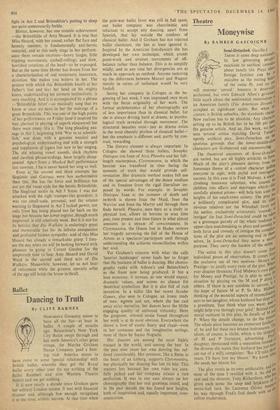Theatre
Moneywise
By BAMBER GASCOIGNE
Semi-Detached. (Saville.) THERE is some deep nation tic law governing people's ( reactions to satirical comedies about family life. Plays abutll foreign families can be as macabre as the mating babilI of the tsetse fly, and no dile will murmur 'unreal.' lonesco is deserve acclaimed, but even Edward Albee's grotes4ve, little squib about the sentimental materialist)) °I an American family (The American Dreatn) iS accepted as significant satire. But when rile context is British suburbia, the standards change' Now realism has to be absolute. Any character setting up to be British has to be WO per cent' the genuine article. And so, this week, we have seen several critics rejecting David Turner's openly artificial play. Semi-Detached, on the spurious grounds that the lower-middle-class characters are ill-observed and unconvincing. The theatrical ancestors of .Semi-Defached are varied, but are all highly artificial in forril„. Much of the play's pleasure derives from Jonsonian theme of a central character gullii! everyone in sight, with joyful and outrage°;' success. In this case it is Fred Midway. a soci°'.. climbing insurance salesman, who coaxes 1115 I children into affairs and marriages which—like i carefully planted pitons— will help him scale the heights of his small-town society. The play °sr a brilliantly complicated plot, and its ed obvious relatives are the Whitehall farce Of the earlier, exclusively aristocratic 'cornedY:0 intrigue' (in fact Semi-Detached could be Iar'eof as a grotesque parody of the whole tradition In upper-class matchmaking in plays and novels).
'
both farce and comedy of intrigue the comPlicr,,° tions of the plot are an amusing end in °el selves. In Semi-Detached they serve a seco° purpose. They carry the burden of the satire' The satire in this play doesn't come fri/itiril individual pieces of observation. It comes the exclusive use of two motives—Money Prestige—to justify every twist of the plot. Wiliero ever disaster threatens Fred Midway's own Pla, the for Money and Prestige, he is able to save in situation by playing on the M and P drive i5 others. If there is any antidote to sorrow, the hope of future M or P. So Mrs. Mid w.'; thinking of the material aspects of reconciliat1°,b says to her daughter, whose husband has slept wiiit a prostitute, 'Just think what you want; arid ry might help you through your grief.' Behind everld moral outburst in this play, lie details of M P. When the details change, so do the The whole piece becomes an exuberant fanfar` of, by and for these two brazen instruments. ft", idiom, of course, is cliché, which is the langl; of M and P literature, advertising. Fr; of daughter, threatened with a separation insteau co the divorce she wants (her husband has just b‘eree cut out of a will), complains: `But it'll take r'ibaj years. I'll have lost my bloom.' We knovv W
she needs her bloom for.
f°r The play revels in its own artificiality, a/1d .,, 'be most of the time I revelled with it. So &ups cast and the director, Tony Richardson, MI° nf is I given each scene the snap and briskness -,,en music-hall turn. Sir Laurence Olivier botIoe'r his way through Fred's foul deeds with all cellent exuberance.


































 Previous page
Previous page